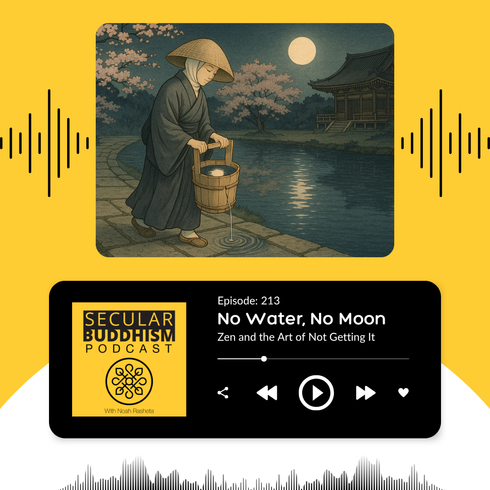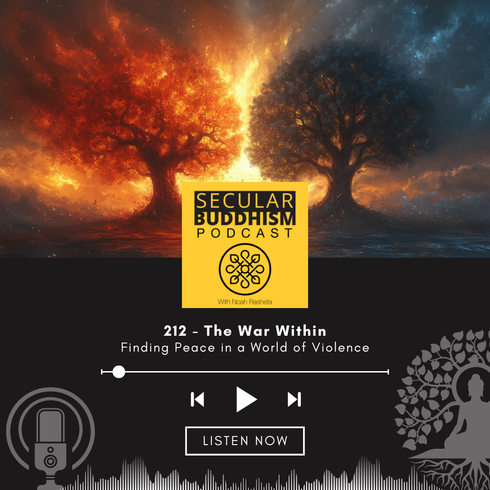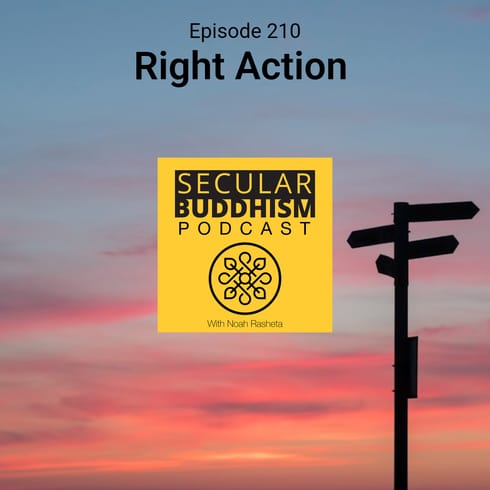
95 - Levels of Morality
What does it mean to be moral? Is morality just a form of obedience? In this episode, I will talk about the concept of levels of morality and how at a certain level, it’s no longer about obeying the rules, it’s about doing what seems right given the entire set of circumstances.
Subscribe to the podcast on:
iTunes – https://itunes.apple.com/us/podcast/secular-buddhism/id1071578260
SoundCloud – https://soundcloud.com/secularbuddhism
TuneIn – http://tunein.com/radio/Secular-Buddhism-p823114/
Stitcher – http://www.stitcher.com/s?fid=80132&refid=stpr
Transcript:
Welcome to another episode of The Secular Buddhism’s podcast. This is episode number 95. I am your host, Noah Rasheta. And today I’m talking about levels of morality.
Keep in mind, you don’t need to use what you learn from Buddhism to be a Buddhist. You can use what you learn to be a better whatever you already are.
Today’s podcast episode is building a bit more on episode number 92, your inner compass. So I wanna jump into this topic. The concept of morality. Now morality is a problematic word for me specifically because if you were to look up the definite of morality, the definition is “principles concerning the distinction between right and wrong or good and bad behavior.”
And as you know, from the Buddhist perspective, the concept of right and wrong, you know, who’s to say what’s right and what’s wrong. The parable of the horse teaches about this concept of what is right and wrong and how difficult or how problematic it can be for us to draw a clear distinction, given the fact that space and time prevent us from seeing the bigger picture and knowing what may have been right at one time or in one set of circumstances may be wrong or bad in another set of circumstances.
So, most cultural views of morality are based honestly more on principles of obedience than they are on principles of what’s right and wrong. Because it becomes problematic to define what is right and what is wrong. Who’s the to say what is right and what is wrong? In the book “Mindfulness in Plain English“, by Bhante Gunaratana. He talks about this concept of levels of morality and I really liked what he has to say about it and I wanna share this concept a little bit in this podcast episode.
So, imagine that here are levels of morality and at the lowest level, we have adherence to rules and regulations that are laid down by someone else. For instance, a parent, a religious leader, a religious ideology or belief system or political leader, something along those lines. So at this level of morality, all you have to do it know what are the rules so that you can follow them, and this level really doesn’t require a whole lot of personal thought or contemplation. You just need the rules and then you need to believe in the authority that’s giving those rules. And at this level, there’s generally some kind of fear associated with breaking the rules and it’s that fear that motivates compliance to the rules. For example, fear of burning in hell in the afterlife, or fear of being imprisoned by the state if you break the rules, things of that nature. So that’s the first level.
The second level of morality also includes the rules just as before, but now you may not have fear as the basis of adherence to the rules. At this stage, the rules have become internalized and you yourself are now the punisher and the enforcer. You’re the one that smacks yourself when you break the rules. So, aside from simply fear, there may now be other feelings. For example, guilt associated with this level of morality. And I think our tendency is to hover, often as these two levels. Maybe starting at the first level and then moving our way into that second level once we’ve internalized the rules that society has imposed on us or that our religious views have imposed on us.
And I see example of this all the time where people want to know like what does Buddhism say about this or that? And that’s essential a search for the question of I need to understand these rules. I’m coming across this system called Buddhism. That’s the authority. I may be reaching this point where I think, “okay, this authority is one that I agree with or that I sympathize with. Now I wanna know what the rules are that are laid out so I can decide if I agree with them or not.” And every rule that we find that we agree with, we’re like, “Yeah, okay.” That gives more authority to the system.
So for example, if I’ve already accepted Buddhism as a valid authority, then I want to know what are the rules that authority is going to give me. And I found myself in this search for awhile too as I was exploring Buddhism early on and trying to decide, well what are the rules, and I’m comparing those rules to my own logic and trying to decide what I think about each rule. So that’s kind of that second level.
Then there’s this third level which is, I think, significantly different than the two previous levels, because at this level or morality, I think perhaps it’s better to refer to it now as ethics, things start to change. So quick side note. Ethics, the definition of ethics is “moral principles that govern a person’s behavior or the conducting of an activity.” So at this level, a person on longer adheres to a set of rules handed down by some authority. At this stage, a person chooses to follow a path of behavior or conduct hat is dictated by mindfulness, introspection, wisdom and compassion so that this level is not easy because it requires considerable effort to understand ourselves, to understand others, to understand reality as a whole. And it essentially requires us to arrive at this unique understanding of what seems right, given a particular set of circumstances or conditions.
For example, a neighbor during World War II that may know that there are Jews hiding out and then when the Nazis come and knock on the door and say, “Hey, are there any Jews here,” that person knows that it’s wrong to lie but knows that it’s okay to lie in this particular set of circumstances because there’s a bigger picture taking place. That’s just an example that popped in my head, but you can imagine what I’m trying to get at is, this level of ethics takes into consideration much more than just the black and white rules.
So this level of ethics requires us to have greater perspective beyond our own limited view, our own point of view and understanding. So this level requires us to also view to the best of our abilities, the bigger picture. Trying to balance our needs and the needs of others. And it requires us to understand our own relationship to the three poisons of greed, hatred and delusion in order to gain a greater understanding of the other side of the story.
This level of ethics is about choosing the most appropriate set of actions that are ideal given the specific set of circumstances we find in. And you can kind of see this level or this concept of morality in that story that example that’s given of the monk that carries the girl across the river.
If you’ll recall that story, the monk had take a set of vows or rules that he was adhering to that he shouldn’t break, which was to never touch a member of the opposite sex. He and the junior monk come across this girl at the bank of the river trying to cross this river, he decides in that moment that the skillful thing to do is to carry the girl to the other side of the river and that’s the end of that for him. But the other monk, the junior monk I would say was at this lower level of morality where there’s a set of rules. He adheres to the authority that gave the set of rules, which was in this case was some other monk or the system itself that had prescribed these rules to not touch a member of the opposite sex.
And he was really concerned with the fact that the senior monk had picked up this girl as if it was no big deal. So what you can see taking place or at least from my perspective, it seems like what’s taking place is you have two people on two different levels of morality and the senior monk who was more at this third level had no problem with what had to take place there at the river while the younger one that was maybe at the second level of morality did struggle with what he had just witnessed and continued to carry until the senior monk gives that powerful lesson in the story where he says, “I put the girl down on the other side of the river. Why do you continue to carry her?”
So that to me embodies this concept of this levels of morality. And for me personally, trying to live a moral life is about being skillful with the relationship that I have with my own thoughts and my words and my deeds. Specifically, as I try to understand myself and try to understand my tendencies, my desires, my aversions, why do I desire somethings and why do I have aversions towards other things. And I’m working with the areas of ignorance in my life and the things that I know that I don’t know and I don’t know that I don’t know. All of these processes of trying to become more introspective help me to understand my sources of anger and hatred or frustration. And the way to practice this form of ethical living is to continually strive to see the bigger picture. To see other angles. To see understand the other side of the story. To understand others. And it requires a form of non-attachment to my own viewpoints and my own beliefs and my own opinions.
In other words, when I can separate my own ideas and opinions and beliefs from this sense of self that I have, I can become more skillful with dealing with difficult situations that require ethical choices or that you could say require morality.
I bring all of this up because it’s been brought up to me before this concept or this idea that if you don’t have a rigid set of rules prescribed by a religion or motivated by a belief in a superior being or a god for example, how could you possibly be a good person. And I think a lot of believers out there have this mindset. In other words, it’s almost like saying if you don’t believe in an authority like God that gives us rules like commandments, isn’t there a risk of no longer wanting to be a good person or doing good things? It’s almost implied like, couldn’t you just, at random, suddenly wanna go robbing banks and killing people or, that’s kind of the line of thought that’s implied.
And I like to usually flip the script and kind of say, well wait a second. Do you really believe that he only thing preventing you from going out and robbing banks and killing people or kicking cats and pinching babies is that because you believe in God and you believe in a set of rules that are handed down from that authority that say don’t do this, and do this, and don’t do that? Is that the only thing keeping you from robbing banks and murdering people?
If so, that’s pretty scary. And I suspect for most people they would agree that the answer is no. That’s not the only reason. So the invitation is, well then why do you think that is? Where does your sense of right and wrong really come from? Where does your sense of morality really come from? And I think that’s a fascinating question to explore. When I was deconstructing my belief system and my faith, this was a situation that I was suddenly faced with. Why are there certain things that feel right and fee wrong? And why do some of the things that felt right because of this specific rule or the belief in this specific authority continue to feel right? Or things that feel wrong continue to feel wrong?
This has been entirely about me trying to understand me. I was trying to ask what does morality mean to me and that’s the invitation with the exploration of this topic and this podcast episode with you. What does morality mean to you? What are your personal ethics? In other words, what principles drive your thoughts and you words and your actions. Do you simply strive to be obedient to the rules or is there something deeper going on? The quest in terms of mindfulness as a practice is to get to know yourself. And that’s my challenge to you, my challenge to myself, and my challenge to you, to spend some time pondering this topic and asking yourself these questions.
I feel like at the end of the day, perhaps morality is simply doing what seems right regardless of what we’re told and obedience is doing what we’re told regardless of whether or not it is right. And there’s a quote similar to that that’s attributed to H.L. Menk and I think I’ve quoted it before, but after doing a little bit more research, there’s no record of him ever having said that, although the sentiment is consistent with his line of thinking. So again, like all of these quotes, quotes can be problematic because we just share quotes and they don’t mean anything. So I wanted to personalize this one and state that as my way of thinking, I want to know which is more important. To try to be moral and what does that mean to be moral. Or to be obedient, and what does that mean to just be obedient, and why? Which of those are more important?
So in terms of this concept of levels of morality, I think it’s kind of cool to explore what level do I feel that I’m at. Or are there fears that motivate my behavior and my thoughts and my actions? Is there the chasing after some kind of reward that motivates my behavior and my thoughts and my actions? Or perhaps there’s something deeper, it just feels right. And if so, why have I internalized them? What would you do, what rules would you follow if you didn’t believe there were any rules to follow?
I think that’s a really powerful introspective question to know about yourself, to ask yourself. So that’s the topic I wanted to explore in terms of levels of morality. I think from the Buddhist perspective, what we’re always trying to explore is this understanding that life is dynamic. Everything is changing and in a world that’s constantly changing, we’ve approached this before. It’s difficult to pin something and say, “Ah, this is good” or “This is bad.” And you maybe listening thinking, “Well yeah, but what about egregious things like child abuse or things like that?” There are no conditions where that’s good. And yes, I agree with you. I don’t think that the implication of a constantly changing world means that sometimes something will be good, though it seems really bad. That’s not what we’re trying to get at.
What we’re trying to get at is this understand that the source of what we consider to be good or bad is something internal. It’s not this external thing.
So that’s the perspective I would invite you to explore and to internalize this way of thinking by asking these questions of yourself. Where do my views of morality come from? What do I view as something good and something ad? And under what circumstances would something that seemed good maybe seem bad or vice versa. Because again, in that mental exploration, and there’s a lot you can learn about yourself, and that’s ultimately the invitation here. What greater thing would you want to know than to know yourself? I think that’s one of the most powerful realms of the universe that you can explore is you, your mind, your actions, and your thoughts and your deeds.
So that’s my invitation to you. And as always, if you want to learn more about Buddhism, you could always go back to the first five episodes of the podcast or you can check out some of my books. “No Nonsense Buddhism for Beginners”, “Secular Buddhism” and the “Five Minute Mindfulness Journal”, all of which are on Noah Racheta.com. And if you enjoyed this podcast episode, please share it with others, write a review, give it a rating on iTunes. And if you’d like to make a donation to support the work I’m doing with the podcast, you can always visit secularbuddhism.com and click the “Donate” button.
And that’s all I have for now, but as always, thank you for listening. I look forward to recording another podcast episode soon. And until next time.



